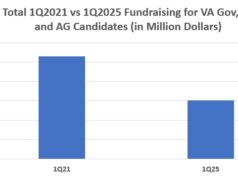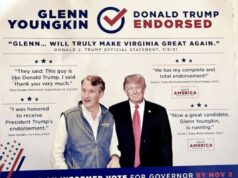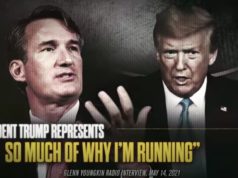See below for audio from the latest Transition Virginia podcast, analyzing “what happened at the Democratic debate for governor” on Tuesday night. The hosts – reporter Michael Pope and Virginia politico Tom Bowman – are joined by Dr. Quentin Kidd from Christopher Newport University. Among other things, they discuss “Is Terry McAuliffe still the front-runner?” and “What the heck did Justin Fairfax say this time?” A few highlights that jumped out at me are highlighted in blue/bold, in the transcript below the YouTube video. There’s a lot to digest here; feel free to weigh in, in the comments section. Thanks.
Kidd: “I cannot help but go back to Terry McAuliffe’s first run for governor and how much the issue of guns and gun control has moved in Virginia politics you know the first time he ran. There had never been a candidate – Democratic or Republican candidate – in Virginia to run and essentially proudly run as a gun control candidate…none of the other Democrats would touch the issue of gun control…they were all sort of leery of past elections where they had even hinted at the idea of gun control and it had cost them. And so McAuliffe runs on gun control or touts it, and people say, you know that’s a death sentence, and he wins. Fast forward to this election cycle and all of the candidates on stage are not only running on gun control, but they’re pushing McAuliffe on the issue of gun control. And I just think that issue alone speaks to how far Virginia politics has moved.”
Kidd: “I think McAuliffe is clearly the front-runner in the race right now. And I think he sees McClellan as either one of two things – either his greatest rival as we go down the stretch into the Democratic primary…in early June. He sees her as either his greatest rival…and/or they’re in the same lane, and so they’re competing for the same set of voters. [note by Lowell – I disagree with this, in that I think McAuliffe most definitely wants McClellan to stay in the race and to not have this become a one-on-one against Carroll Foy; I also don’t think voters are thinking ideologically, but more in terms of who they know/”like,” plus “identity politics”] And so I think McAuliffe’s strategy here is to essentially reduce the space between them as much as possible, so that a McClellan-leaning voter right now may say well, McAuliffe is in the lead, he’s most likely to win, so I’m going to go ahead and give McAuliffe my vote. And so that may be the strategy that he’s pursuing by essentially pulling her very closely…I think it is fair to say that McClellan worked closely with McAuliffe as governor. I mean, they’re in the same lane politically, and ideologically they’re very much alike. And so it’s interesting to watch the dynamic between those two, because it’s a different dynamic than say the dynamic between a McAuliffe and any of the other candidates – Fairfax or Caroll Foy for example. It’s a different dynamic because I think they’re really struggling to attract the same set of voters…I don’t know that there’s ice between McClellan and McAuliffe as much as there is political rivalry, the sense that sort of your time has passed, McAuliffe, it’s time to give others the opportunity…sort of political posturing, I don’t get bad blood…
Kidd: “I was stunned when Justin Fairfax made that statement [comparing himself to George Floyd and Emmett Till]. It runs against so many waves in our politics right now. The idea that he’s accused of sexual assault, and yet he’s going to push back on that and try to couch himself as a victim in the guise of George Floyd or Emmett Till…really was a stunner to me. And he’s been pilloried all over social media for it. One of his accusers came out right after the debate and said it wasn’t a false accusation…said I’m not ashamed of bringing to light what happened to me etc. So I don’t know what that got him. It didn’t get him sympathy…I think when you’re in a position of being not the front-runner in a five-person field, I don’t know that it’s the right kind of buzz. And so I don’t know that it does him any good. I think he could have said I’ve been a victim without going so far as to equate his situation with George Floyd or Emmett Till and maybe have gotten the same point across without the gobsmacked response that he seems to have gotten.”
Bowman: “This moment from Fairfax really gave me Brett Kavanaugh vibes, where he just completely defied any reasonable sense of good decorum. And obviously Emmett Till, George Floyd…were horribly murdered…and the fact that Fairfax is still alive makes it a false comparison, period. Fairfax of course is accused for being a rapist. I would point out the Washington Post did NOT exonerate him; they pointed out some discrepancies in the stories that did not exonerate Justin Fairfax, so there’s a lot of misinformation here.”
Kidd: “Republicans have, like you said, signaled that [the Parole Board controversy] is going to be a big issue for them, and I think it’s going to be a part of a larger kind of criminal justice/crime issue that seems to be shaping up on the Republican side and the fact that McAuliffe…appointed the parole board chair when he was governor does link him to this controversy, even if the controversy itself wasn’t under his watch. And so I do think he’s going to have to respond to this. I think he’ll respond to it like he did, he’ll say hey, I wasn’t there when this happened. And he may just brush it off, but I think he’s going to have to deal with it in the fall. Republicans are going to are going to try to hang this issue all over him and make him drag it around the entire campaign if he’s the Democratic nominee.”
Bowman: “There’s no doubt that the Republicans are going to bring it up. I don’t really think too many Democrats are going to bring it up outside of the context of these pot shots. But the reality is nobody votes on the parole board…nobody knows how it works; you know, we don’t really have parole in Virginia anyway…it’s limited to people who were incarcerated before a certain point in time when we got rid of parole. So the reality is as controversial as this may be…this is more of a scandal for the current administration not the previous one and it’s not going to stick.” [Note by Lowell: I strongly agree with Tom Bowman’s analysis here, as opposed to Quentin Kidd’s. I do NOT think the Parole Board is a strong issue for November, nor will it stick to McAuliffe, because of the reasons Bowman stated.]
Kidd: “[Jennifer Carroll Foy]’s got an impressive resume, an impressive background and is just an impressive person generally. I didn’t like that she looked a little scripted in the debate, and I think she could have looked a little less scripted and I think it would have come across better. But her story is really compelling, and it’s really compelling contrasted against Terry McAuliffe. And I just have to say at the end of the day, if Terry McAuliffe wins this nomination and becomes the Democratic nominee for governor, I wish Carroll Foy had stayed in the General Assembly a little bit longer, put the time in and had done this…a cycle or two down the road, because I really think that the basic bread-and-butter material of a candidate is there with Jennifer Carroll Foy.”
Bowman: “I also noticed at times it seemed like Foy was just reading the words directly in front of her. And that’s a criticism that’s come up about her before…as somebody who in the past has been seen as speaking in great platitudes and on the surface makes amazing points but when you dig into the policy it’s just not there, you know. And my wife also noticed it last night, too; it seemed like if these candidates were in a position to drill down into some of this policy…certainly compared to Jennifer McClellan…McClellan almost got into the weeds so much that it was reminiscent of Al Gore at times. But Foy spoke in 30 000-foot platitudes and I think that is something that will come up again in this primary.”
Kidd: “We all know who Harry Byrd is; a lot of a lot of younger voters who might not vote in this primary at all don’t know who Harry Byrd is. But I don’t think she can run against Harry Byrd and win. The reference to her being sort of Al Gore-like in her policy wonkishness is I think a great one. You know, if Jennifer Carroll Foy is too superficial, Jennifer McClellan might be too in the weeds on policy. And it’s hard for the voter to shift from Harry Byrd to deeply in the weeds on policy. And so I think it’s really sort of a difficult space to navigate between those two things, and that’s kind of what she was doing. You know, she’s most comfortable in the weeds on policy but she recognizes that she’s got to try to get out of those weeds a bit and so she draws these references every so often. But they in my mind seem to be sort of forced, because she knows she needs to. And I just don’t know that that’s an effective debating strategy.”
Kidd: “At the end of the day, I think Justin Fairfax has a really good balance between the sort of, you know, he’s really great on the stump, he’s got just enough policy chops I think to be sort of substantive enough when he needs to be. He’s not super scripted, but he has the clout of the sexual assault allegations hanging over him and he can’t get out from under that. And so it’s tough to say to voters, elect me because I’ll fight for you, when he’s still having to fight for himself. And I think that’s his primary challenge here.= And he’s still got a body of support out there among the electorate, I just don’t know that it’s enough at this point. And i don’t think the debate changed that, to move him into a different position vis-a-vis Terry McAuliffe…”
Kidd: “So the odds are against him, but I have to say of the five people on that stage in that debate, I think Lee Carter was the only candidate who the more you listened to him, the more you liked him, because he makes sense to a lot of people. And I could see Lee Carter, if you just took off the democratic Socialist label, I could see Lee Carter being really appealing to the sort of Trump voter out there, the Republican voter who was attracted to Trump’s populist language [Lowell’s note: I hear what Kidd’s saying, but I really don’t see any Trump voters ever voting for a socialist/democratic socialist, and I don’t see Trump as “populist” particularly, but instead tapping into white “grievance” and white IDENTITY politics, which are things Carter absolutely does NOT do] and so in an in a weird sort of way i think Lee Carter could create a cross-ideological coalition if he could make it to be a statewide candidate. I just don’t know that he can get through the primary process to do that. But I have to say from beginning to end, I was impressed with him – his command of policy, his ability to articulate his views and his issues. I was impressed with him the entire debate.”
Bowman: “I agree…Lee Carter in my opinion had the best night of everybody during the Democratic debate, because there weren’t really any expectations, he doesn’t have very much statewide name recognition among people who are watching, and because there were no expectations. He just surpassed everything that had been set, compared and contrasted with Terry McAuliffe, who performed about as expected; and Jennifer McClellan, who struggled at times to be the showman and got stuck in the weeds; and Foy, who was a showman but couldn’t find the weeds. Carter had an extraordinarily strong night during the debate.”














